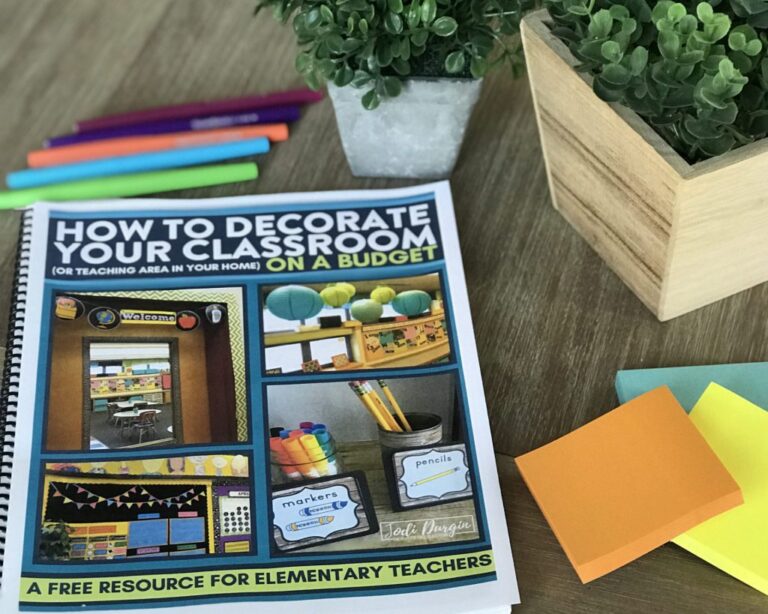A career change for teachers can feel daunting, but teaching is HARD. Long hours. Lack of resources and support. Inadequate salary. Stress. There are so many things working against you when all you are trying to do is help your students become kind and caring people who have the knowledge and skills to make the world a better place. It is hard not to get burnt out in the process. Teacher friend, I want you to know you are doing incredibly important work. You are valued. You are appreciated. Your students depend on you each and every school day. You are making a difference. I know you don’t hear that enough.
I recognize you found this post for a reason. It will explain why teachers like you are leaving teaching, suggest ways to improve your current situation, and offer alternatives. Learn all about career change for teachers below!

Why are Teachers Leaving Teaching?
Below are some of the reasons teachers are leaving the classroom and are looking for a career change.
- Increasing demands from administrators and local/state government
- High pressure and stress from Increased data collection and standardized testing
- Low appreciation and lack of support from administrators and students’ parents
- Lack of resources due to inadequate funding
- Long hours due to ever changing and increasing initiatives and expectations
- Growing student needs
- Inadequate salary, which often leads to side jobs
- Overwhelmed by government and district mandates
- Better career opportunities elsewhere
- Personal reasons (e.g. relocating for spouse’s job)
- Desire for work life balance
What is Work Life Balance and Why is it Important?
Work life balance is the idea that people require time devoted to their professional life and time devoted to their personal life. Work life balance is important because it prevents burnout, improves mental and physical health, and increases productivity.
How Do I Find a Work Life Balance?
Finding a work life balance is hard especially as a teacher. Even though it is incredibly difficult, it is essential to work towards it because of the effects it has on your health and well-being. Check out these blog posts to get tips on how to find a work life balance:
What are Strategies I Can Use to Destress?
Finding effective ways to de-stress is critical as a classroom teacher. Some people find that yoga works from them, while others find kickboxing to be an effective strategy. Curl up with a good book on your couch or sign up for an art lesson with friends. There are so many different things you can do to help you relax and improve your mental and physical health. You need to find what works best for you! Grab some other teacher relaxation ideas to help you make it through the school year.
3 Ways to Make Teaching Easier
Below are 3 ways to make teaching easier and help you re-discover the career you once loved.
1. Use Your Personal Days
Don’t be afraid to use your personal days to give yourself a break. Set up emergency sub plans so that you can take a day off without having to put much thought into it. Taking time away will help you recharge and come back feeling happier and less stressed.
2. Ask for Help
Utilize your team members, parent volunteers, friends, and family members. Often times there are people in your life who are eager to help you. Don’t be afraid to reach out!
You can also join online communities like Facebook groups to connect with other teachers and ask for advice. Our Clutter-Free Classroom Facebook Group is a great place to start!
3. Invest in Time-Saving Resources
Check out my all-access resource collections for elementary teachers that will give you access to thousands of resources at your fingertips at a discounted rate. Imagine what you could do with all of the time you’ll get back from planning and prepping!
Is Leaving Teaching a Good Idea?
Determining if leaving your current teaching job is the best option for you is a very personal decision. Here are some questions to consider:
- Why am I unhappy?
- Could this feeling change next year?
- Will this feeling change if I change roles within the school? Within the field?
- How long have I been unhappy?
- What would I rather be doing?
- Do I have a plan on how to achieve this?
- Do I have any financial restrictions that may prevent me from leaving my current job?
- What time of the year is it? Can I wait until the end of the school year?
- What do my closest colleagues, family, and friends think you should do?
- What steps could I take to improve my current situation?
If you are 100% sure that leaving the teaching profession is the right choice for you, consider the potential jobs/careers below and follow the steps on how to prepare for the transition.
What can a Teaching Degree be Used For?
A teaching degree is valuable and equips you with a highly desirable skill set. Teachers are effective presenters, collaborators, instructors, leaders, organizers, and multitaskers.
Education Positions in a School Setting
If you would like to stay in a school setting, consider transitioning into one of the positions below.
- Special Education case manager
- Behavior specialist
- School librarian
- Guidance counselor
- School administrator
- Instructional coordinator (e.g. ELA, math, science, social studies, and Title One)
- Content area specialist (e.g. reading and math)
- Technology integration specialist
- Interventionist (e.g. reading and math)
- Title One tutor
- Paraeducator or teacher’s aid
- Substitute teacher
Education Positions Outside of a Public School Setting
If you would like to stay in the Education field but not necessarily in a public school setting, look into one of the positions below.
- Museum educator
- Education policy researcher
- Standardized test developer
- Education product and supply company associate
- Sales representative for a textbook company
- Content developer
- Educational consultant
- Curriculum specialist
- Grant writer for non-profit
- Department of Education employee
- Private school teacher
- Online teacher (e.g. VIPKID)
- After-school program teacher
- Admissions counselor
Positions Outside of the Education Field
If you would like to get out of the Education field, check out one of these positions.
- Youth activities director
- Event/wedding planner
- Real estate agent
- Personal fitness trainer
- Marketing associate
- Restaurant manager
- Store manager
- Paralegal
- Human resource representative
- Corporate trainer
- Technical writer
- Publishing writer
- Publishing editor
- Entrepreneur
10 Steps to Take Before Resigning from Your Current Teaching Position
Below are 10 steps to take before you resign from your current teaching position.
1. Take time to reflect.
Reflect on the questions above. If you think resigning from your current role is the best choice for you, then continue to the next step.
2. Take a personality test.
Take the personality test at 16Personalities.com to learn more about yourself. Use the information from the assessment to explore your strengths, weaknesses, ideal career paths, and workplace habits. Take notes on these areas.
3. Look for jobs base on your results.
Google “jobs for (insert your personality type).” For example, if you found that you were a consul, you would google “jobs for consuls.” Jot down the jobs on the list that you find to be interesting. Be open to different opportunities.
4. Choose one of the careers from the list.
Think about which of the careers on the list best align with your interests and strengths. Choose one to move forward with.
5. Network.
Begin to network by reaching out to friends and past colleagues. If you have a LinkedIn account, search to find if you are connected with anyone in the field you are pursuing.
6. Look for opportunities to strengthen skills.
Determine if additional education is required and pursue it.
7. Update your resume.
Updating your resume is a great way to ensure you are prepared and can jump on an opportunity that presents itself.
8. Collect references.
Ask current or former colleagues and administrators for references (depending on your situation).
9. Start your job search.
Search for job opportunities and draw on your connections.
10. Prepare for interviews.
Begin to interview with confidence and a deep understanding of who you are and what you bring to the table. Get the life and job you want and deserve!
In closing, we hope these ideas for a career change for teachers was helpful!





